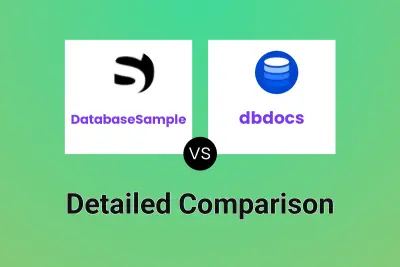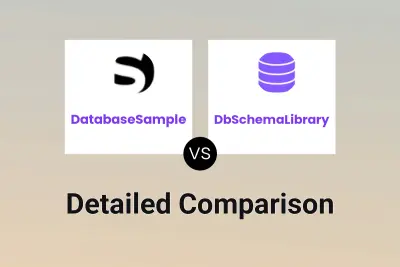 DatabaseSample
VS
DatabaseSample
VS
 dbdocs
dbdocs
DatabaseSample
DatabaseSample is a professional database design and management platform that provides developers with comprehensive sample schemas and a robust sandbox environment. The platform offers ready-to-use database structures for various applications, including e-commerce, social networking, and content management systems.
The platform features an advanced database diagram tool, SQL script export capabilities, and cloud-based collaboration features. With over 1500 samples and a 100% satisfaction rate, DatabaseSample enables developers to efficiently create, modify, and experiment with database designs in a controlled environment.
dbdocs
dbdocs offers a cloud-based solution for generating comprehensive database documentation directly from code, utilizing the open-source DBML (Database Markup Language) standard. Designed for seamless integration with development processes, dbdocs allows users to define, version, and maintain database schemas collaboratively, ensuring consistency and clear communication across teams.
The platform supports password-protected sharing, customizable access controls, embedded documentation views, and visual relationship mapping among tables. Enhanced visualization features such as color-coded table headers, sticky notes, and schema changelog history empower teams to easily onboard, manage, and hand off database projects with clarity and ease.
Pricing
DatabaseSample Pricing
DatabaseSample offers Free pricing .
dbdocs Pricing
dbdocs offers Freemium pricing with plans starting from $20 per month .
Features
DatabaseSample
- Sample Schemas: Pre-built database structures for various applications
- Database Sandbox: Safe environment for testing and experimentation
- SQL Script Export: Generate and export database scripts
- Diagram Tool: Visual database design interface
- Cloud Integration: Collaborative database design features
- Database Conversion: Support for MySQL, PostgreSQL, and MSSQL conversions
dbdocs
- DBML-Based Schema Definition: Define database documentation using the open-source DBML language.
- Cloud-Hosted Documentation: Access, share, and manage database docs online.
- Secure & Collaborative Sharing: Password protection, private mode, and invitation-based collaboration.
- Embedded Documentation Views: Integrate documentation into external platforms such as Notion or Confluence.
- Visual Relationship Mapping: Visualize table relationships and metadata for improved understanding.
- CI/CD and Git Integration: Incorporate documentation updates into DevOps pipelines and version control.
- Schema Changelog History: Review, compare, and manage all schema changes with unlimited version history.
- Custom Visualization: Table groupings, header colors, diagram detail toggling, and sticky notes.
- Team Management: Unified workspace, member roles, and centralized admin and billing controls.
- Self-Hosted Option Available: Support for enterprise-level security requirements with private deployments.
Use Cases
DatabaseSample Use Cases
- Creating new database designs from scratch
- Converting databases between different SQL platforms
- Learning and practicing database management
- Prototyping application databases
- Exploring industry-standard database structures
- Collaborative database development projects
dbdocs Use Cases
- Onboarding developers quickly with clear, visual database documentation.
- Sharing secure database documentation with internal teams or external stakeholders.
- Integrating up-to-date schema documentation into CI/CD pipelines.
- Collaboratively managing and reviewing schema changes during development cycles.
- Embedding live database documentation within knowledge bases or project management platforms.
- Simplifying database handovers between software agencies and clients.
- Supporting data governance strategies with living documentation.
Uptime Monitor
Uptime Monitor
Average Uptime
100%
Average Response Time
344.17 ms
Last 30 Days
Uptime Monitor
Average Uptime
99.56%
Average Response Time
382.77 ms
Last 30 Days
DatabaseSample
dbdocs
More Comparisons:
Didn't find tool you were looking for?

